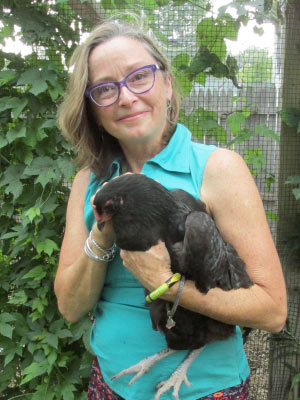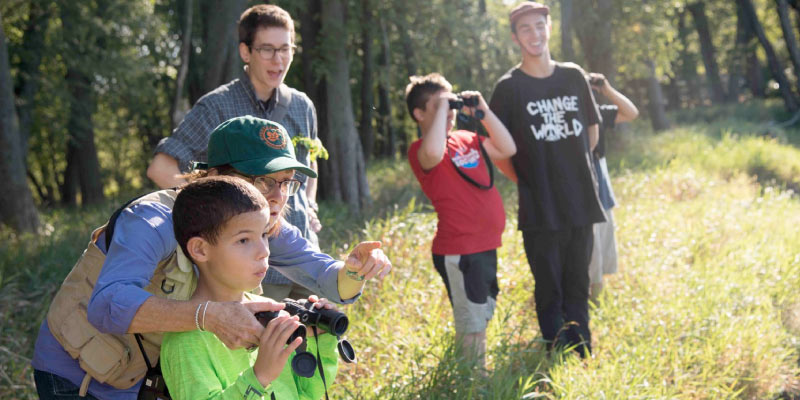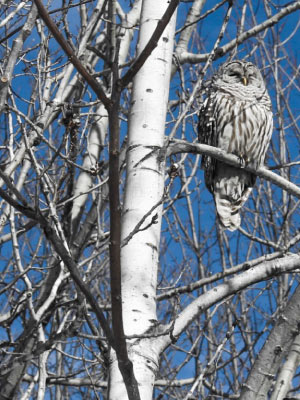
Megan’s special place was a tree. It was a big, old elm in Warner Park, where she spent the afternoons with Bird Buddies, her after-school group. What made the tree so special was its hollowed-out base — a hollow that perfectly fit the Sherman Middle School girl and her collection of twigs and rocks. But what Megan saw in the hollow as magic, the City of Madison parks department saw as a safety hazard. No number of letters or meetings or phone calls would change their mind, though the community tried. The parks department cut Megan’s tree down. When she saw the empty place where her tree had been, Megan sat down in the grass and cried. Bird Buddies’ founder and leader, Trish O’Kane PhD’15, tried to comfort her, rationalizing that the parks department was just trying to keep Megan and her friends safe. “But it was still alive,” Megan sobbed into her knees. It was still alive.
“I realized then how adults acquire these layers over our hearts — these layers of rationalization. That it’s okay to cut down a tree. That it’s okay to kill the animals. That it’s okay to fill in a wetland. That all this stuff is okay,” O’Kane reflects. “[Megan] taught me that we need to preserve that childlike clarity about what’s right and what’s important.”
O’Kane remembers exactly where and when she emerged from her rational adult layers and began to question the world around her. She was wading through toxic sludge — one part exploded paint cans, two parts ceiling insulation — in what used to be her living room. It was October 6, 2005: 40 days after Hurricane Katrina nearly wiped New Orleans off the map. After working for 10 years as a human rights journalist in Central America, O’Kane had accepted a teaching position at Loyola University in New Orleans. On Monday, August 29, she should have been teaching her very first class — an 11:30 a.m. freshman communications lecture. Instead, she and her husband had fled to Alabama as the hurricane submerged their new home, along with their entire Lakeview neighborhood. October 6 was the first time she was allowed to go back. There was no need for keys when she arrived; the National Guard had kicked in all the doors searching for bodies. Ninety of her neighbors had drowned.
“That’s when I started thinking really deeply [that] the way we live is so wrong. The way I’ve lived is so wrong. If we can’t live in a biodegradable way with what we’re facing right now, we’re going to destroy everything,” she says. “I just knew that was the next learning journey for me. I need to understand what happened, why it happened, and work so it doesn’t keep happening.”
“If everybody who loves their place would defend it the way the birds do, with their lives, we could have a patchwork quilt of solutions.” — Trish O’Kane
O’Kane decided to leave New Orleans after the following semester. “I don’t want to blame people who stayed in New Orleans,” O’Kane stresses, acknowledging the privileges that come with mobility — plus she wasn’t from New Orleans and didn’t have any family there. “It was easy for me, after teaching that year, to say I’m not staying here anymore. I can’t go through this again,” she says. While she finished out her first and final semester (in January, after the university reopened), O’Kane needed a distraction — something happy to dampen the stresses of teaching college freshman in Katrina’s aftermath. So she bought a couple of birdfeeders.
“Birds were my first teachers of ecology,” she says. “As I watched them at the feeders, I noticed there seems to be a pecking order. Why does one get the seed first?” She wondered. “Where do they get their water from? And you notice maybe they go to a puddle. If they drink out of a puddle, what if chemicals are in that puddle? What if car oil is leaked into that puddle?” The birds had raised even more questions, so seeking answers, O’Kane headed north to pursue a PhD in the UW’s Nelson Institute for Environmental Studies. There, she found Warner Park, an elm tree with the perfect hollow, and the gray catbird.

Under the tutelage of her PhD advisor Jack Kloppenburg, O’Kane began to learn about the world around her. “It was a fabulous place to go to school to try to figure out what happened in New Orleans,” she says, but as she settled in Madison, she started to notice how similar Madison and New Orleans are. “It’s a city that’s more water than land,” she observed. In her studies, she learned that most of Madison used to be a marsh, including her new neighborhood of Warner Park. And when it rains? “The water remembers,” O’Kane explains. “The marsh returns. It doesn’t matter if you pave it over.” Just like her home in Lakeview, her new nest in Warner Park was built on a wetland. But O’Kane quickly learned that her neighbors had been defending that wetland for decades. “My PhD turned into a community project,” she says, and she’s filled with pride to see the group — Wild Warner — still thriving today.
Within Warner Park, O’Kane met a new group of avian tutors. One piece of her PhD work was a geolocation study of the park’s gray catbirds — directed by the aptly named Anna Pidgeon. The gray catbird is about the length of a robin, but much thinner. A relative of the mockingbird, they’re known for their boisterous vocalizations and fiercely territorial nature. O’Kane and Pidgeon were curious about the catbirds’ migratory habits, so they placed tiny geolocator backpacks on the birds to see where they ended up. “They came back a year later, and we discovered they’d gone to southern Mexico, the Yucatán, and northern Guatemala,” O’Kane says, still in awe. “How does a bird that size cross the Gulf of Mexico and come back in good health,” she pauses, “with a little, tiny backpack on its back?”
Perhaps the biggest piece of O’Kane’s work in Warner Park — the piece that laid the groundwork for her current role as a senior lecturer at the University of Vermont (UVM) — involved a Sherman Middle School class and a tree-loving girl named Megan. In 2010, O’Kane launched the Bird Buddies (now Nature Explorers) after-school program, which used birding as a way to teach kids about their world — just like the birds had taught O’Kane. The program paired the middle schoolers with college mentors — students in O’Kane and Kloppenburg’s Environmental Studies 600 capstone class. Once a week, the buddies would walk the mile between their school and the park and explore nature.
“It was a bit out of the box for a science PhD,” O’Kane admits, remembering how she approached Kloppenburg with the pitch to energize kids about nature. But Kloppenburg was fully on board. “He not only approved it, he helped me teach the class!” Kloppenburg joined the Bird Buddies for a winter day of sledding. On Valentine’s Day, he brought them all bird-shaped chocolates. He even testified in public meetings on behalf of Warner Park’s geese.
“If you want to be really effective, you have got to organize,” Kloppenburg told O’Kane when she pitched the idea. “Organize?” O’Kane asked. “This is a PhD. I thought I have to read stuff and sit in a library. But Jack was like, ‘You have to organize.’ And he was right.” It’s a lesson she never forgot.

O’Kane flew the UW nest in 2015 to join the faculty at UVM’s Rubenstein School of Environment and Natural Resources. Today, she shares the lessons of her birds with a new group of students through her Birding to Change the World course, which pairs UVM undergrads with kids at the local Flynn Elementary School (home of the Flynn Fireflies). Whenever her students are feeling down or frustrated, or they don’t feel like they can make a difference, O’Kane tells them the story of Warner Park. “It’s just one little wetland, but if everybody who loves their place would defend it the way the birds do, with their lives,” she emotes, “we could have a patchwork quilt of solutions.”
“Birds teach me perpetually to be amazed and humbled, and that gives me hope. Because if we don’t know everything, there are so many things we can discover,” O’Kane reflects. “Maybe there’s some solution sitting right in front of us if we can just slow down long enough to notice.”
Whether she knew it at the time or not, since the day that O’Kane waded into her home in 2005, her brain has been formulating a book. It’s about her teaching, but perhaps more importantly, her learning: the lessons she’s gathered from her students and her birds. In May 2023, HarperCollins-Ecco will publish Birding to Change the World. “When the birds return,” she says with a smile.
Trish O’Kane PhD’15 is one of six Nelson Institute alumni award winners. Their stories are featured throughout this magazine and online.